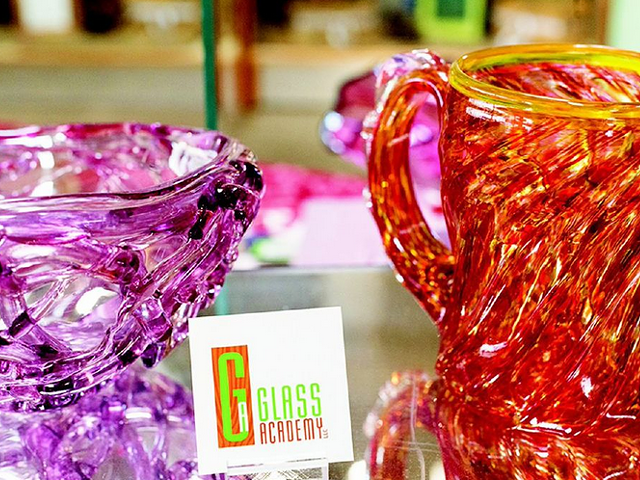In the inner-ring suburb of Ferndale, one of the city's fastest-growing business segments is mead, the artisanal beverage made from honey. Within the last decade, two new businesses have opened that specialize in the product, and they both get high marks from aficionados of the drink.
In business for almost a decade, B. Nektar Meadery is tucked away in the light industrial end of Ferndale, in a space where you'll usually find a crew of about a half-dozen men churning out quality product in a room that smells more like a cider mill than a manufacturing facility. Founder Brad Dahlhofer says he's been a craft brewer for a long time, but only started on mead to make a special batch for the toast at his wedding.
"A year later," he recalls, "my wife got laid off. I just kept on with making mead — and the mead started getting really good. I'd been trying to find some meads in the stores, but there was really nothing out there, and my wife came up with the idea of starting a business and selling it. Since she was laid off, she had the time to spend on doing the research on getting a license and stuff. We pretty just made up our minds as of '06."
Even after joining forces with their brewer friend Paul Zimmerman, the group's vision was modest. "You know, none of us had any idea how small or big, we just thought it would be nice if we could sell some of the stuff we were making in the basement," he says with a laugh. "That was the scale of our imagination at the time."
It took two years for them to get the necessary licensing, and they opened their doors in August 2008. "We had a line of about 300 people at our grand opening here in this warehouse; it was like out the door," Dahlhofer recalls. "I think we all just pretty much looked at each other and said, 'This is something bigger than we expected!'"
Why is mead so hot right now? Dahlhofer says the rise of craft brewing and the new food movements are making people care more about what they're eating and drinking. "It seems like the stars just happen to be aligned in the right way where people are ready to try mead again after thousands of years."
Of course, Dahlhofer also says the quality of their mead differs from most others. Unlike many meaderies, B. Nektar's product isn't syrupy sweet, and they produce some exciting flavors, more than 31 in all. Every month they try something new in extra-limited batches, sometimes as small as 30 gallons, with such imaginative flavors as pineapple coconut, raspberry-chipotle, and Ethiopian harrar, as well as varietal meads that take their flavors right from the flowers the bees feast upon, be it orange blossom, buckwheat, tupelo, wildflower, or star thistle.
Dahlhofer stresses that his meads are a mix of sweet and dry, and he tries to keep the selection surprising. "We're homebrewers, so it's all about playing and experimenting," he says. "Some of the things we make are more wine-like, and some of the things we make are more beer-like."
Ironically, the newest entry into Michigan's mead category is one of the drink's longtime students. Mead expert Ken Schramm literally wrote the book on mead — writing The Compleat Meadmaker in 2003, and is the kind of guy who can expound for hours at a time about mead. Schramm and company opened Schramm's Mead, a tasting room and production space — with a capacity to do 300-gallon batches — on West Nine Mile Road last year. There, tipplers can try Schramm's nectar, pairing drinks with a menu of small plates.
Schramm doesn't mind being compared to B. Nektar, and actually worked with Dahlhofer to produce a ginger mead a few years ago. "Brad's got a lighter touch than we have. Brad is leaning more toward the beer crowd, where we're leaning more toward the wine crowd. Take our Heart of Darkness mead. It's well-respected around the country and highly rated on ratebeer.com. Our stuff right now tends to be more an expropriation of individual flavors."
A home brewer since the 1980s, Schramm is the kind of tenacious researcher who, when he dives into a project, as he admits, he tends to "go overboard."
"I've been active in the mead community now — jeez — 20-some-odd years? I guess I have kind of a high profile," he says with a laugh. "Really, I set out in the early '90s to learn as much as I could about the subject. I'm one of those guys who gets pretty obsessed about stuff like this.
Now in his mid-50s, Schramm is finally doubling down on the production game. With candid laughter, he says, "I've had the books out for 10 years, and now I'm finally getting into the business when other people have had a five-year head start — and I've told them all my tricks! What kind of a businessman goes out and teaches everybody everything they need to know to be more successful than you are? Apparently that's me."
But he doesn't really see it as competition so much as a scene poised to hit critical mass.
"The more good mead that's out there, the whole industry benefits," he says. "Besides, there's still a lot of room in mead, a potential variety as great as that of wine."
But Schramm also has an ace up his sleeve, something that's "really in a different slot" — his treasured Heart of Darkness mead, which retails at $100 for a 375-milliliter bottle, made with the same Belgian variety of cherries used in Lambics.
"I was trying to find something as beguiling as a first-growth Bordeaux and knew I was going to have to come up with something that's got real depth of flavor, that makes you shift back," he says. "And Heart of Darkness creates what I call the 'involuntary wow.' I've heard two people tell me, 'That's the best thing I've ever put in my mouth.' And that, to me, is the very best thing I can hear." — mt
Schramm's Mead is at 327 W. Nine Mile Rd., Ferndale; 248-439-5000; schrammsmead.com.





